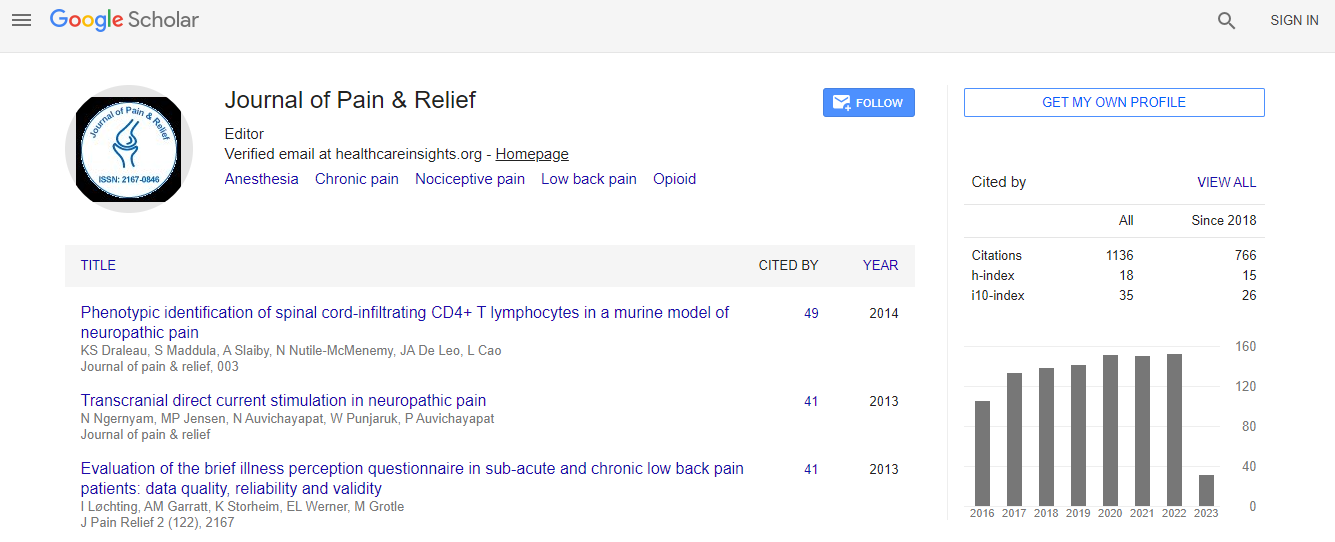Our Group organises 3000+ Global Conferenceseries Events every year across USA, Europe & Asia with support from 1000 more scientific Societies and Publishes 700+ Open Access Journals which contains over 50000 eminent personalities, reputed scientists as editorial board members.
Open Access Journals gaining more Readers and Citations
700 Journals and 15,000,000 Readers Each Journal is getting 25,000+ Readers
Recommended Conferences
42nd Global Conference on Nursing Care & Patient Safety
Toronto, CanadaGoogle Scholar citation report
Citations : 1556
Journal of Pain & Relief received 1556 citations as per Google Scholar report
Journal of Pain & Relief peer review process verified at publons
Indexed In
- Index Copernicus
- Google Scholar
- Open J Gate
- Genamics JournalSeek
- Cosmos IF
- RefSeek
- Hamdard University
- EBSCO A-Z
- OCLC- WorldCat
- Publons
- Geneva Foundation for Medical Education and Research
- Euro Pub
- ICMJE
Useful Links
Recommended Journals
Related Subjects
Share This Page
Older, anxious and stressed were associated with higher fibromyalgia among refugees in Jordan
International Conference on Fibromyalgia and Chronic Pain
Ahmed Mohammad Al-Smadi
American University of Madaba, Jordan
ScientificTracks Abstracts: J Pain Relief
Abstract
The aim of this study was to examine predictors to fibromyalgia among refugees in Jordan. A cross sectional method was utilized. 384 refugees were recruited from four different cities in Jordan. In addition to fibromyalgia questionnaire, anxiety, stress, post traumatic stress disorder, insomnia and refugees√ʬ?¬? demographical details were collected. Logistic regression was used to examine predictors to fibromyalgia; all variables were included as possible predictors. The results of the current study showed that 23.7% (n=91) of refugees had moderate to severe fibromyalgia. Logistic model was statistically significant (P=0.001). The model explained 60% of the variance in fibromyalgia categories and correctly classified 84.9% of the cases. Refugees live in Irbid city were 7.58 times more likely to exhibit fibromyalgia compared to refuges lives in Zarqa city. Increase age was associated with an increase likelihood of exhibit fibromyalgia. Increase post traumatic stress disorder, and anxiety scores were associated with higher fibromyalgia. This study showed higher fibromyalgia prevalence among refugees in Jordan. In addition, refugees live in Irbid city, older, anxious, and stressed after displacement were associated with higher fibromyalgia. The study recommend to assess fibromyalgia among all refugees in Jordan and consider these factors that showed to be associated to fibromyalgia when assess refugees. In addition, the study recommend health care worker to use non-pharmacological and pharmacological interventions to elevate fibromyalgia among refuges. Furthermore, the current study recommends further studies to explore other factors that were not included in the current study such as type of diseases associated with fibromyalgia.Biography
Ahmed Mohammad Al-Smadi has completed his PhD Nursing in 2013 from University of Ulster. He has joined the American University of Madaba as Assistant Professor in Nursing since Feb 2012. He has published 5 papers in reputed journals.
Email: a.smadi@aum.edu.jo

 Spanish
Spanish  Chinese
Chinese  Russian
Russian  German
German  French
French  Japanese
Japanese  Portuguese
Portuguese  Hindi
Hindi 
